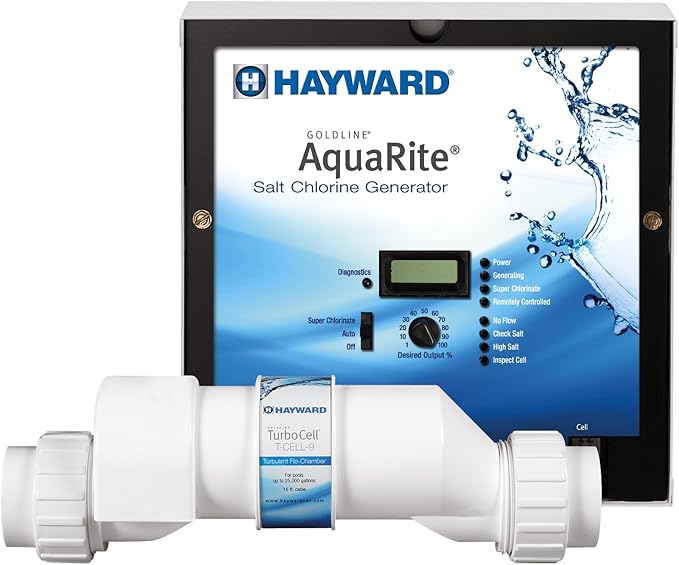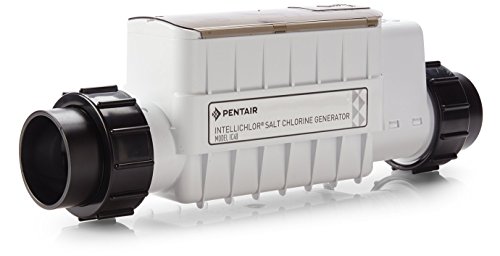Getting ready to make your backyard into a dream staycation? When considering what type of pool system you want to install, consider a saltwater pool. What is a saltwater pool? It’s a filtration system that uses electrolysis to create chlorine to disinfect the water. Instead of adding chlorine, you add salt.
Don’t expect the water to be as salty as the ocean. Saltwater Pools have only one-tenth of the salinity of seawater. What you can expect is crystal clear water that’s easy on the skin and eyes. Your pool water will feel softer and you’ll feel refreshed after your swim.
What is a Salt Water Pool?
Not to be confused with an ocean water pool, which is actually a pool filled with seawater, a saltwater pool is quite different. The concentration of salt is far less than in ocean water. In fact, it is barely detectable to your taste buds.
What is a saltwater pool? Unlike chlorine-based systems, saltwater pools don’t leave residue on your hair and skin. While you are basking in the sun, enjoying the fresh, cool, water of your pool, the salt is undergoing chemical reactions to create just enough chlorine to eliminate algae and organic particles.
How does a saltwater pool work?
You most likely have had some experience with a traditional chlorine filtering system. You know how harsh chlorine pools can be. Here are the differences between saltwater versus a chlorine pool and how a saltwater pool works.
While there are still levels of chlorine in a saltwater pool, it will have much less than a chlorine system. A saltwater system produces a steady level of chlorine. This is accomplished through a saltwater generator.
The saltwater generator uses salt to produce hypochlorous acid through the process of electrolysis. This happens when salt is broken down by passing electricity through a solution of saltwater. If you have ever tasted teardrops, the content of salt in a saltwater pool is very similar.
How long after adding salt to the pool can you swim?
Pool Knowledge says that pool experts suggest waiting 20 minutes to an hour before swimming after you add salt. They recommend waiting until the salt is dissolved and circulated throughout the pool.
While there is no research that supports this, most saltwater pool experts concur that you should let the salt circulate through the main drain before swimming. The finer grade of salt you use, the quicker it will dissolve and circulate.
If you are in a hurry to swim, you can get a test kit that will let you know the levels of the elements in the pool water and if it’s safe to take a plunge.
How to Convert Pool to Salt Water
If you have a pool already and are using an antibacterial agent, the best advice according to Swim University is to go ahead and drain your pool before installing the best saltwater pool system.
The active ingredient in antibacterial agents contains a chemical that is not compatible with chlorine. If this chemical is not removed from the water, your new pool water will not be balanced properly. The salt-converted chlorine will not be as effective.
If you aren’t using an antibacterial agent and you don’t have much chlorine in your water, you can opt not to drain your pool to make the switch from a chlorine system to a saltwater system.
It’s important that you test for the presence of the important elements and adjust the levels before making the switch. Make the adjustments gradually. When your water is balanced, you’re ready to add salt.
Best Saltwater Pool System:
Your new saltwater system will have two main parts, the cell, and a control board. The cell is used for the electrolysis conversion of salt to chlorine. The control board adjusts the amount of chlorine that is generated.
Choose the best saltwater pool system based on your pool capacity. The best units allow you to adjust the amount of chlorine that you can produce. Some units offer digital readouts that allow you to see salt levels, perform cell cleaning, and adjust flow control.
1. INTEX 26643EG SX1500 Krystal Clear Sand Filter Pump for Above Ground Pools, 16in
View at AmazonIntex is ideal for above-ground pools over 16 ft. The sand only needs to be replaced once every 5 years. The maximum capacity is 19,600 gallons.
1. Hayward Goldine AQR9 AquaRite Electronic Salt Chlorination System
View at AmazonCertified by the National Sanitization Foundation, this filtration unit is solid and effective for saltwater pools. The pre-wire feature makes it easy to install. This unit is only suitable for in-ground pools. The maximum capacity is 25,000 gallons.
3. Pentair 520555 IntelliChlor IC40 Salt Chlorine Generator Cell
View at AmazonThe automatic shut-off features prolong the cell life of this system. Data is tracked, easy to access, and read. The maximum pool size is 40,000 gallons. It does require a separate power center.
4. Solaxx CLG10A Saltron Retro Self Cleaning Salt Chlorine Generator
View at AmazonFor those looking for an economic and easy switch to a saltwater chlorination system, Solaxx Saltron is ideal. There is no need to refit the old system and it’s a breeze to install. The maximum pool size is 20,000 gallons.
5. ControlOMatic ChlorMaker Saltwater Chlorine Generation System
View at AmazonNo need for a timer because of the built-in cycles. Requires a GFI outlet and handles a maximum of 1,000 gallons.
5. Circupool SJ-40 Salt Water Chlorine Generator
View at AmazonThe titanium cell has a long life and the self-cleaning feature makes this pump easy to maintain. It even tracks levels for you. It fits with any system and works with any filter or pump. It’s only suitable for in-ground pools.
How Much Salt to add to the Pool
Hayward Pool Maintenance suggests that the ideal level of salt, to begin with, is 2700 to 3400 parts per million (ppm). 3200 ppm is the optimum level.
Make sure you determine the number of gallons of water in your pool and add the salt according to the manufacturer’s instructions. Keep the following considerations in mind when adding salt to our pool:
Make sure that:
- Low salt levels will result in low chlorine production which will reduce the efficiency of your system
- High salt levels may cause your chlorinator to shut down and may make your water taste salty
- If you do taste salt, that means salt levels are around 3400 to 4000 ppm
- Salt is constantly being recycled so you shouldn’t be losing a lot of salt during the swimming season
- Salt doesn’t evaporate or wear out
What are the Benefits of a Salt Water Pool
High amounts of chlorine can be harmful to the eyes and skin. By installing a saltwater pool system, the amount of chlorine in your pool will be reduced. Your water will feel softer against your skin.
Chlorine won’t be stinging your eyes, turning your hair funny colors, and fading your favorite swimming suit. After the initial installation of your saltwater pool system, maintenance is a breeze. You will love the ease and your nostrils will love the lack of chlorine tablets in your life.
Pros and Cons of a Salt Pool
Pros
- You no longer have to handle and store hazardous chlorine
- They are much gentler on eyes, skin, and clothing
- Softer feeling water with less chlorine odor
- Chlorine is produced on an as-needed basis
- Saltwater pools require less maintenance compared to chlorinated pools
- Can be cost-effective over time and save money in the long run
Cons
- Saltwater pools are more expensive than traditional pools and require a larger initial investment
- More complex systems that may require service from technicians
- Salt can be damaging to metals and certain materials
- You may have to replace underwater fixtures, lighting, liners, and masonry work
Making The Decision
We have answered the question, what is a saltwater pool, and described the benefits of switching from a traditional chlorination system. If heavily chlorinated pools bother you, consider the softer, kinder, and cleaner option of a saltwater system.
While a saltwater pool system still does use chlorine, salt is converted to chlorine and it is generated in smaller amounts. The switch from chlorine to salt is simple. The result is a teardrop salty flavored water that you can swim in and enjoy all summer without the use of harsh and toxic chemicals.






